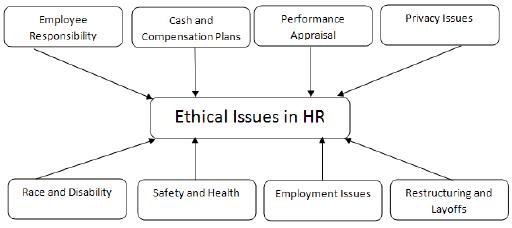Business Ethics - HRM
Human Resource Management (HRM) deals with work force management, manpower planning and other employee related activities in an organization. Therefore, we can say that it is a special branch of management where ethics play a crucial role. HRM concerns human issues, especially those related with compensation, development, industrial relations, health and safety issues. However, there are sufficient disagreements in managing HRM issues that stem from various quarters.
Ethics and Market System
Various types of market systems affect business and HR ethics differently and hence, business ethics becomes negotiable. Occupations in which the market conditions do not favor the employees, it becomes necessary to have government and labor union interventions for controlling the possible exploitation of employees.
Free market systems empower employees and the employers equally; negotiations are used to create win-win situations for both of these parties. Government or labor union interventions are often harmful in free market systems because they stall the operations and create unnecessary hindrances.
With the growth of globalization, the concept of globalizing labor has gained importance. Trade unions have ceased to exist and the role of HR as such in issues like employee management, desirable policies and practices has become debatable topics.
Many people now have the opinion that HR is nothing but a part of the stakeholders, which initiates major strategic and policy decisions to divulge the organization and gear it towards profit making.
There cannot be a single opinion about ethics in HR that is completely convincing. Market is neither an ethical institution nor an unethical one; no policies and procedures can govern and align the markets for human well-being. However, the need of these policies and procedures cannot be denied or ignored because human development is the ultimate aim of all human initiatives.
HRM Ethics
Out of all organizational issues or policies, ethical considerations are the most difficult to deal with. Issues arise in employment, remuneration and benefits, industrial relations and health and safety.

Important Clusters of HRM related with Ethics
Some HRM issues are more important than the rest because we, as human beings, are more responsible for the development and empowerment of the human resources involved in the operation and management of organizations. Some of these issues are discussed below.
Cash and Compensation Plans
There are some general ethical issues pertaining to the employee salaries, executive perquisites and compensations and the annual incentive plans, etc. The HR department is often under pressure to increase the band of base salaries. There is always an increased pressure upon the HR function to pay out more incentives to the top management and provide justification for the same to retain them.
Further, ethical issues arise when HR deals with long-term compensation and incentive plans by consulting with the CEO or an external consultant. There is a pressure on the HR managers on favouring the interests of the top management in comparison to that of the other employees and stakeholders.
Race, Gender, and Disability
There are several examples of organizations where, until recently, the employees were treated differently based on the race, gender, origin, and their disability. This is not the case anymore since the evolution of laws and a regulatory framework standardized for the employee behavior. In ethical organisations, the only factor of appraisal is performance.
Employment Issues
Human resource managers face many dilemmas in hiring employees. One particular dilemma stems from the pressure of hiring one, who has been recommended by a friend or someone from the family of a top executive.
Another major dilemma arises due to employees who are later found to have fake documents. Both of the issues are critical. In the first case, the person may have been trained and filling the position is critical. In the second case, the person may be efficient in his work and have the right kind of attitude. Both the situations are tough and HR managers face such cases day in and day out.
Privacy Issues
All human beings working with any organization have their personal life. An employee needs the organization to directly or indirectly protect his/her personal life. This personal life includes things like the religious, political and social beliefs etc.
There are many ethical issues in HR that are related to health and safety, restructuring and layoffs and employee responsibilities. A debate is still going on whether some activities are ethically permitted and why some are not. Layoffs, for example, are not considered unethical as they were thought of in the past.



